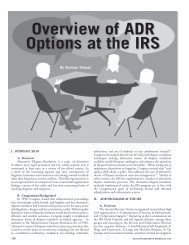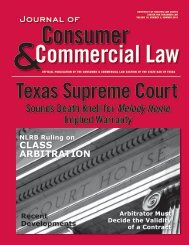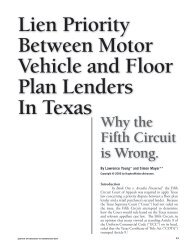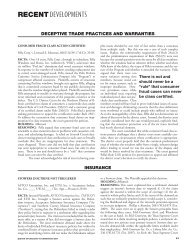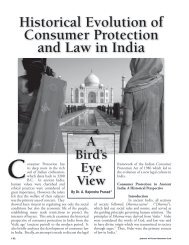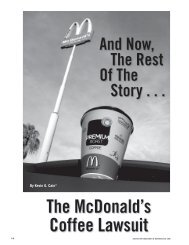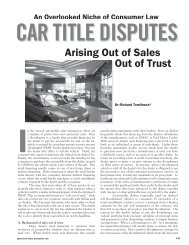Teaching Consumer Credit Law in an Evolving Australian Economy
Teaching Consumer Credit Law in an Evolving Australian Economy
Teaching Consumer Credit Law in an Evolving Australian Economy
Create successful ePaper yourself
Turn your PDF publications into a flip-book with our unique Google optimized e-Paper software.
RECENT DEVELOPMENTS<br />
COMMON LAW, NOT DTPA, APPLIES TO UNCON-<br />
SCIONABILITY ASSERTED AS AN AFFIRMATIVE DE-<br />
FENSE<br />
Philadelphia Indem. v. SSR Hospitality, 459 Fed. App. 308<br />
(2012).<br />
FACTS: Pla<strong>in</strong>tiff, SSR Hospitality, was a corporation formed<br />
to purchase the Hawthorn Suites Hotel <strong>in</strong> Aust<strong>in</strong>, Texas. SSR<br />
purchased <strong>an</strong> <strong>in</strong>sur<strong>an</strong>ce policy, which <strong>in</strong>cluded coverage for<br />
property damage, contents, <strong>an</strong>d <strong>in</strong>come, from Defend<strong>an</strong>t,<br />
Philadelphia Indemnity Insur<strong>an</strong>ce Comp<strong>an</strong>y (PIIC). Dur<strong>in</strong>g<br />
the covered period, the floor <strong>in</strong> a conference room <strong>in</strong> the hotel<br />
collapsed. After SSR submitted <strong>an</strong> <strong>in</strong>sur<strong>an</strong>ce claim, PIIC<br />
<strong>in</strong>vestigated <strong>an</strong>d discovered property damage to the hotel that<br />
predated the policy’s <strong>in</strong>ception. PIIC determ<strong>in</strong>ed that the costs of<br />
repairs could exceed $450,000. It issued a letter partially deny<strong>in</strong>g<br />
SSR’s claim. SSR then executed a release of liability <strong>in</strong> exch<strong>an</strong>ge<br />
for $13,984.39, which was the cost of the floor repairs m<strong>in</strong>us<br />
the deductible. After receiv<strong>in</strong>g payment, SSR filed additional<br />
claims for the cost of the rema<strong>in</strong>der of the repairs. In response to<br />
these claims, PIIC filed a declaratory judgment action seek<strong>in</strong>g a<br />
declaration of its obligations under the policy with respect to the<br />
cost of the damages. PIIC then moved for summary judgment,<br />
<strong>in</strong>sist<strong>in</strong>g that the release barred all of SSR’s claims. SSR filed a<br />
response <strong>an</strong>d countermotion for summary judgment argu<strong>in</strong>g that<br />
the release was unconscionable. The district court gr<strong>an</strong>ted PIIC’s<br />
motion.<br />
HOLDING: Affirmed.<br />
REASONING: The parties disagreed about whether the<br />
Texas Deceptive Trade Practices Act (DTPA) applied to SSR’s<br />
affirmative defense of unconscionability. SSR argued that the<br />
DTPA, which <strong>in</strong>cludes unconscionability as a cause of action<br />
<strong>an</strong>d allows consumers to collect damages for unconscionable<br />
conduct by sellers, should apply. PIIC urged the court to apply<br />
common law, which conceives of unconscionability strictly as <strong>an</strong><br />
affirmative defense to contractual perform<strong>an</strong>ce. The Fifth Circuit<br />
agreed with PIIC that common law should apply, cit<strong>in</strong>g the<br />
Texas Practice Code of <strong>Consumer</strong> Rights <strong>an</strong>d Remedies §<br />
4.8 (3d ed. 2009) (expla<strong>in</strong><strong>in</strong>g the traditional common law view of<br />
unconscionability <strong>an</strong>d the concept under the DTPA). The court<br />
then considered the facts of the case <strong>an</strong>d determ<strong>in</strong>ed that the<br />
release was neither subst<strong>an</strong>tively nor procedurally unconscionable.<br />
INSURANCE<br />
Beneficiary of <strong>in</strong>sur<strong>an</strong>ce policy is not DTPA<br />
consumer<br />
Kocurek v. CUNA Mut. Ins. Soc’y, 459 Fed. App’x. 371 (5th<br />
Cir. 2012).<br />
FACTS: Louis Kocurek purchased <strong>an</strong> accidental death <strong>an</strong>d<br />
dismemberment <strong>in</strong>sur<strong>an</strong>ce policy nam<strong>in</strong>g Pla<strong>in</strong>tiff as the primary<br />
beneficiary <strong>an</strong>d Mr. Kocurek’s children from a previous marriage<br />
as cont<strong>in</strong>gent beneficiaries. Defend<strong>an</strong>t issued the policy, valued<br />
at $200,000, on November 1, 2004. Approximately four months<br />
after purchas<strong>in</strong>g the policy, Defend<strong>an</strong>t sent Mr. Kocurek a<br />
mail<strong>in</strong>g, offer<strong>in</strong>g him additional coverage. The second policy,<br />
which was issued April 1, 2005 <strong>in</strong> the amount of $300,000,<br />
named Mr. Kocurek’s children as primary beneficiaries <strong>an</strong>d<br />
Pla<strong>in</strong>tiff as the cont<strong>in</strong>gent beneficiary. Mr. Kocurek paid the<br />
premiums on both of these policies until his accidental death on<br />
July 27, 2006.<br />
After Mr. Kocurek’s death, Pla<strong>in</strong>tiff attempted to collect<br />
benefits under the 2004 policy <strong>an</strong>d his children attempted to<br />
collect benefits under the 2005 policy. Defend<strong>an</strong>t refused to pay<br />
benefits on the earlier policy, po<strong>in</strong>t<strong>in</strong>g to a “one policy only”<br />
provision found <strong>in</strong> both policies. Pla<strong>in</strong>tiff claimed the provision<br />
was unfair <strong>an</strong>d mislead<strong>in</strong>g, as Defend<strong>an</strong>t often solicited customers<br />
with mail<strong>in</strong>gs offer<strong>in</strong>g additional coverage without mention<strong>in</strong>g<br />
the “one policy” provision. The Pla<strong>in</strong>tiff also contended that the<br />
“one policy only” clause was mislead<strong>in</strong>g because it was placed<br />
at the end of the list of policies under a “General Provisions”<br />
head<strong>in</strong>g <strong>in</strong>stead of elsewhere <strong>in</strong> a more appropriate place among<br />
other policies.<br />
Pla<strong>in</strong>tiff alleged three causes of action: false, mislead<strong>in</strong>g<br />
or deceptive acts or practices; fraud/misrepresentation; <strong>an</strong>d negligence/gross<br />
negligence.<br />
Defend<strong>an</strong>t filed a motion<br />
to dismiss the claim argu<strong>in</strong>g,<br />
among other th<strong>in</strong>gs,<br />
that the Pla<strong>in</strong>tiff was not a<br />
consumer under the Texas<br />
Deceptive Trade Practices<br />
Act (DTPA). The district<br />
court gr<strong>an</strong>ted the motion<br />
<strong>an</strong>d Pla<strong>in</strong>tiff appealed.<br />
HOLDING: Affirmed <strong>in</strong><br />
part, reversed <strong>in</strong> part, <strong>an</strong>d<br />
rem<strong>an</strong>ded.<br />
Pla<strong>in</strong>tiff alleged three<br />
causes of action:<br />
false, mislead<strong>in</strong>g<br />
or deceptive acts<br />
or practices; fraud/<br />
misrepresentation;<br />
<strong>an</strong>d negligence/gross<br />
negligence.<br />
REASONING: The court found that as far as Pla<strong>in</strong>tiff’s claims<br />
under the DTPA were concerned, the motion to dismiss was<br />
properly gr<strong>an</strong>ted. Accord<strong>in</strong>g to Tex. Bus. & Com. Code § 17.50,<br />
only a consumer may ma<strong>in</strong>ta<strong>in</strong> a cause of action directly under<br />
the DTPA. In this case, the court found that Pla<strong>in</strong>tiff’s husb<strong>an</strong>d<br />
actually purchased the policies; therefore he was the customer for<br />
DTPA purposes, not the Pla<strong>in</strong>tiff. To that po<strong>in</strong>t, Pla<strong>in</strong>tiff argued<br />
that she was a consumer by virtue of her community property<br />
<strong>in</strong>terest <strong>in</strong> the policies, which were paid for with community<br />
funds. The court decl<strong>in</strong>ed to consider this argument on appeal<br />
however, as it was not timely raised <strong>in</strong> the district court.<br />
Journal of <strong>Consumer</strong> & Commercial <strong>Law</strong> 45



